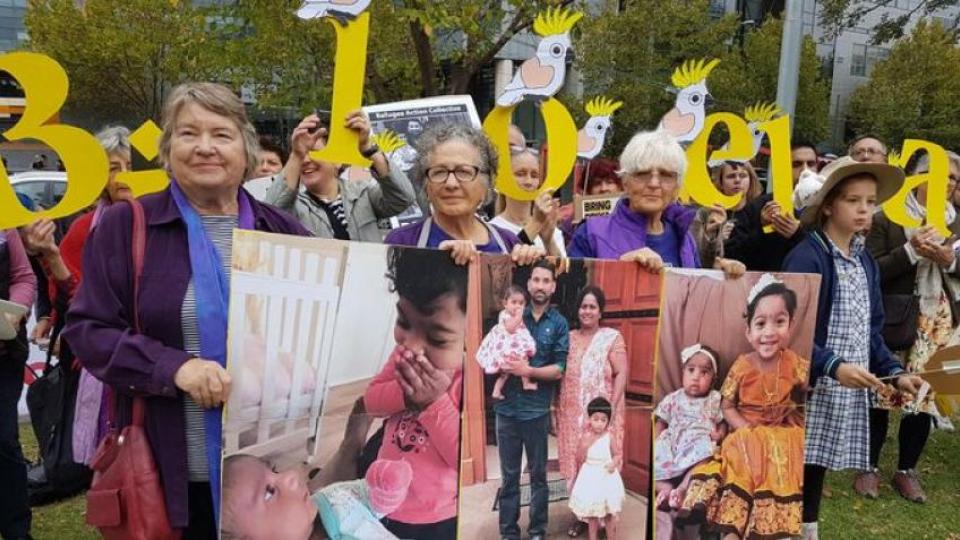End Australia’s alt-white immigration policy

Events over the last few weeks have revealed just how politicised Australia’s immigration policy has become.
In two separate incidents, Border Force detained two au pairs on the grounds they intended to violate the terms of their tourist visas and work illegally in Australia.
Far from the government’s usual racist outcry of “illegals taking the jobs of Australians”, then-immigration minister Peter Dutton intervened to overturn the decisions. In what he described as “a discretionary and humanitarian act”, he granted the au pairs visas.
No doubt being white helped the au pairs’ cause; as did the fact they were coming to work for a big Liberal Party donor and one of Dutton’s old police mates, respectively.
The bit that gets me, though, is the talk of a “humanitarian act”.
Why can’t this be applied to Sri Lankan refugees Priya, Nades and their two Australian-born children who, after living in the Queensland town of Biloela for the past three years, are being held in immigration detention?
For months now, the entire town of about 6000 people in North Queensland has been advocating for the Tamil refugee family to be returned home rather than be deported to Sri Lanka, where they face the threat of persecution.
If ever there is a case for a “humanitarian act”, this is it.
Instead, the Coalition (and Labor) prefer to use deportations as a political tool for stoking fear and winning votes.
The major parties also know that the threat of deportations can be a useful mechanism for creating a second class of migrant workers, intimidated into accepting fewer rights and conditions.
Then there has been the issue of the government granting visas to people with certain ideas but not others.
Canadian white supremacist Lauren Southern was recently in the country, among other things to speak at a protest rally demanding Australia grant white South African farmers refugee visas.
Southern became a leading figure of the alt-right through her videos on YouTube focusing on issues of white pride and building a fortress Europe against migrants and refugees. She has taken part in missions in the Mediterranean Sea to physically obstruct refugee rescue boats.
Milo Yiannopoulos, another alt-right figure who, on his days off from protesting with signs reading “feminism is cancer”, spends time singing karaoke with white nationalists and neo-Nazis, also had no problems entering the country last year.
Nor did Nigel Farage, a former leader of the far-right United Kingdom Independence Party who is touring Australia at the moment. Talking about Australia’s own racist Senator Pauline Hanson, Farage said “being against Islamism is the right place to be”.
Yet when it came the turn of former United States intelligence analyst-turned-whistleblower Chelsea Manning to visit the country for a speaking tour, she was denied a visa on “character grounds”.
Unlike these alt-right figures who cry about “free speech” while trolling and abusing people on the internet and the various platforms they are given in the media, Manning is a whistleblower who was prepared to risk the full wrath of the US empire to leak videos exposing US war crimes.
Manning is someone who advocates for a world without hate and violence and who has expressed deep and widely-held concerns that the United States is slipping further into a police state.
She stood by these beliefs, even when faced with decades in prison.
Many people would consider that to be impeccable character grounds, but not so the government.
Perhaps Australia’s involvement in the US-led occupation in Iraq had something to do with this.
Or the government’s proclivity for passing anti-whistleblower laws in recent years, such as the Border Force Act, which threatens to jail those who report on child abuse in detention centres.
The solution is not more visa bans to stop far-right figures coming into Australia.
The more free movement we can have for all people across all borders the better.
Open borders are desirable for all the benefits they bring for international workers’ rights, culture and combating climate apartheid, especially as rich countries seek to lock out people from poorer countries that are most affected by climate change.
We should instead use visits by far-right activists to organise mass festivals of resistance and protest everything they and their supporters stand for.
Because, let’s be honest, these far-right figures aren’t exactly starting any new fires here — they are largely fanning the flames that have been well and truly lit by decades of racist and anti-refugee policies implemented by Coalition and Labor governments alike.
Until these parties are kicked out of parliament, Australia’s racist immigration policies are unlikely to change.
[Zebedee Parkes is a refugee rights activist and member of the Socialist Alliance national executive.]